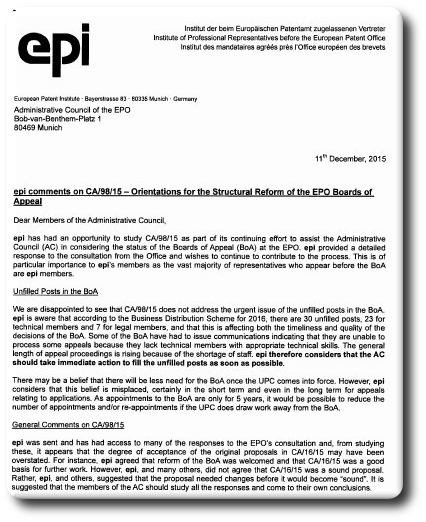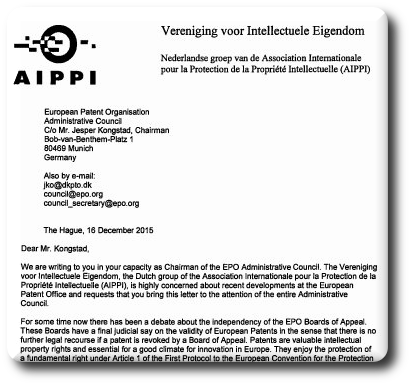epi
European Patent Institute • Bayerstrasse 83 • 80335 Munich • Germany
Administrative Council of the EPO
Bob-van-Benthem-Platz 1
80469 Munich
11th December, 2015
epi comments on CA/98/15 – Orientations for the Structural Reform of the EPO Boards of Appeal
Dear Members of the Administrative Council,
“We are disappointed to see that CA/98/15 does not address the urgent issue of the unfilled posts in the BoA.”epi has had an opportunity to study CA/98/15 as part of its continuing effort to assist the Administrative Council (AC) in considering the status of the Boards of Appeal (BoA) at the EPO. epi provided a detailed response to the consultation from the Office and wishes to continue to contribute to the process. This is of particular importance to epi’s members as the vast majority of representatives who appear before the BoA are epi members.
Unfilled Posts in the BoA
We are disappointed to see that CA/98/15 does not address the urgent issue of the unfilled posts in the BoA. epi is aware that according to the Business Distribution Scheme for 2016, there are 30 unfilled posts, 23 for technical members and 7 for legal members, and that this is affecting both the timeliness and quality of the decisions of the BoA. Some of the BoA have had to issue communications indicating that they are unable to process some appeals because they lack technical members with appropriate technical skills. The general length of appeal proceedings is rising because of the shortage of staff, epi therefore considers that the AC should take immediate action to fill the unfilled posts as soon as possible.
“In particular, epi considers that the Office should not be involved in appointing or re-appointing members of the BoA or the EBoA.”There may be a belief that there will be less need for the BoA once the UPC comes into force. However, epi considers that this belief is misplaced, certainly in the short term and even in the long term for appeals relating to applications. As appointments to the BoA are only for 5 years, it would be possible to reduce the number of appointments and/or re-appointments if the UPC does draw work away from the BoA.
General Comments on CA/98/15
epi was sent and has had access to many of the responses to the EPO’s consultation and, from studying these, it appears that the degree of acceptance of the original proposals in CA/16/15 may have been overstated. For instance, epi agreed that reform of the BoA was welcomed and that CA/16/15 was a good basis for further work. However, epi, and many others, did not agree that CA/16/15 was a sound proposal. Rather, epi, and others, suggested that the proposal needed changes before it would become “sound”. It is suggested that the members of the AC should study all the responses and come to their own conclusions.
Legal Basis
It is clear that the Office has seen that there may be legal problems with its proposal, epi appreciates the fact that the Office has asked for independent legal advice from an expert on the potential legal problems. However, epi considers that it is essential for the members of the AC and interested parties to see not just the advice but the instructions on the basis of which the advice was prepared. If you do not know the question, you cannot tell whether the answer is useful.
“The BoA and the EBoA will be making decisions regarding the operation of the Office or on references from the President of the Office.”As epi noted in its response to the consultation, it is essential for there to be a proper legal basis for “attributing” the powers for dealing with the BoA to the proposed new President of the BoA. It is clear that, at present, in many of the functions performed by the AC in connection with the BoA, the EPC specifies that the AC must consult the President of the Office. However, if the BoA are to be truly independent of the Office, then the requirement for consulting with the President of the Office should no longer apply, epi would favour any solution to this problem which does not require amendment of the EPC.
It appears that consideration should be given not only to the “attribution” of the powers of the President of the Office but also to the effect of Articles 6 and 7 EPC and the Protocol on Centralisation (see below).
External Members of the Enlarged Board of Appeal
epi supports the proposal that there should be external members of the Enlarged Board of Appeal (EBoA) when the EBoA is considering petitions under Article 112a EPC. These external members should be present in both 3- and 5-membered panels.
Unit Headed bv the President of the BoA
epi considers that the creation of a President of the BoA and the removal of the office of Vice-President of DG3 is a positive move. However, epi does not see the need for a completely new “unit” as epi considers that the existing Presidium of the BoA, with suitable alterations in composition, would function effectively, epi suggests that the Presidium should include external members of the EBoA and observers.
Transfer of Powers
epi also supports the “attribution” of powers from the President of the Office to the President of the BoA. However, epi considers that, for this to be effective, the Office should not be involved in matters related to the BoA at any level below the level of the AC.
In particular, epi considers that the Office should not be involved in appointing or re-appointing members of the BoA or the EBoA. The BoA and the EBoA will be making decisions regarding the operation of the Office or on references from the President of the Office. If the Office is involved in the appointment and reappointment of members, then there will remain a perception that the BoA are not independent of the Office. It is for this reason that epi suggested that there should be a Judiciary Committee (see below).
Boards of Appeal Committee
Although epi is in principle in favour of a Boards of Appeal Committee (BoAC), epi considers that the structure for the BoAC proposed in CA/98/15 is not properly balanced. In particular, the only person on the BoAC from the BoA is the President of the BoA (without a voting right), epi considers that there should be more members of the BoA on the BoAC. As explained in epi’s response to the consultation, epi considers that there should be less representation from the AC and a chair who is not a member of the AC. Also, for the reasons explained above, epi considers that the Office should not be represented at meetings of the BoAC. The AC will still have overall decision-making power as any proposal from the BoAC must be decided on by the AC.
“Also, for the reasons explained above, epi considers that the Office should not be represented at meetings of the BoAC.”epi still considers that there should be a Judiciary Committee, as explained in epi’s response to the consultation, as well as the BoAC. The Judiciary Committee should be responsible for appointments and reappointments to the BoA.
epi considers that the composition of the BoAC is especially important if, contrary to epi’s suggestion, the BoAC is solely responsible for providing recommendations to the AC regarding appointments and reappointments. epi considers that it is essential for the appearance of independence that the appointments and re-appointments are made on objective grounds of competence and having independent members and BoA members on the BoAC will ensure that it is seen that such competence is independently assessed.
“epi considers that it is essential for the appearance of independence that the appointments and re-appointments are made on objective grounds of competence and having independent members and BoA members on the BoAC will ensure that it is seen that such competence is independently assessed.”Paragraph 13 of CA/98/15 refers to the BoAC working on a “general level”, epi agrees that this should be the case but considers that it will be necessary for there to be clear terms of reference for the BoAC to ensure that it only works at the “general” level.
epi appreciates the proposal that there should be observers from Business Europe and epi on the BoAC.
Rules of Procedure
epi also agrees that the BoAC, in a suitable composition, could be responsible for drafting the Rules of Procedure (RoP) for the BoA and the EBoA. However, epi considers that proposals for the RoP should not be made by the Office, contrary to the suggestion in paragraph 17 of CA/98/15. Since the BoA and the EBoA decide on the actions of the Office, any involvement of the Office in providing the RoP would be seen as significantly reducing the independence of the BoA.
“Since the BoA and the EBoA decide on the actions of the Office, any involvement of the Office in providing the RoP would be seen as significantly reducing the independence of the BoA.”It is epi’s view that the BoAC should consult widely about any proposed amendments to the RoP and, in particular, should consult the Presidium and users before any amendment is presented to the AC for approval.
The second half of paragraph 15 of CA/98/15 indicates that users would like to see a change in the RoP to ensure better predictability and consistency of proceedings, epi agrees that measures should be taken to ensure better predictability and consistency of proceedings. However, epi considers that this does not require only an amendment to the RoP. Predictability and consistency also depends on the attitudes to the individual Boards, not on the RoP.
Human Resources
epi considers that it will be essential to have appropriate contractual arrangements for the BoA but, apart from the following, has no comment on the present proposals. The only comment relates to the point in paragraph 26 of CA/98/15 about “budgetary constraints”. Again, in order to ensure the independence from the Office, epi considers that any budgetary constraints should be determined solely by the AC. It will be necessary for the AC to instruct the Office to make appropriate contributions from the Office’s revenues to the BoA as the level of the appeal fee will not cover the operational costs of the BoA.
Conflict of Interest
“The location of the BoA will have no impact on the perception of independence.”epi is concerned that CA/98/15 appears to be arguing for overly onerous rules on conflicts of interest. If such rules are too onerous, they will deter people from outside the Office applying for positions in the BoA, especially if there are onerous restrictions on what such a person can do after leaving the BoA. epi is therefore in favour of a principles-based code of conduct rather than a prescriptive set of rules.
Premises
It appears to epi that the discussion of moving the BoA to different premises should be treated separately from any discussion on institutional reform. The location of the BoA will have no impact on the perception of independence. CA/98/15 refers in paragraph 58 to the perception of independence being lower if the BoA remain in Munich. However, there does not seem to be any problem with having the DPMA and the Bundespatentgericht in Munich or the Dutch Patent Office and the Dutch Courts in The Hague. The UK Intellectual Property Office was not moved to Newport because of any perceived lack of independence of the UK Court. Also, the branch of the Office in The Hague is physically remote from the seat of the Office in Munich but there is no perception that the branch at The Hague is independent of the seat in Munich. It is the institutional legal arrangements which will make the BoA independent of the Office, not any possible physical separation.
“It is the institutional legal arrangements which will make the BoA independent of the Office, not any possible physical separation.”Before a decision is taken on premises, as noted above, epi would also suggest that the AC should have a sound view on the legal basis for moving the BoA to a different location, without the need to change either Articles 6 and 7 EPC or the Protocol on Centralisation, epi notes that CA/98/15 does not give any cost estimate for the option of not moving the BoA at all.
Summary
epi continues to support the AC and the Office in their considerations of the structural reform of the BoA and considers that CA/98/15 is a helpful contribution. However, as noted above, epi considers that there are still areas where further detailed analysis is needed, epi looks forward to contributing further to the analysis at the forthcoming AC meeting.
epi repeats that, in the medium term, the way to improve the situation of the BoA is to fill the unfilled posts so that the BoA have the appropriate technical skills to decide on the large backlog of cases it already has.
Yours sincerely,
Tony Tangena
President
Will the EPO and its AC buddies (often acting more like the President’s lapdogs) take this letter seriously or will they continue to disregard input even from the stakeholders who pay the EPO? This is getting serious and rapidly becoming too much to be bearable. █

























 Content is available under CC-BY-SA
Content is available under CC-BY-SA